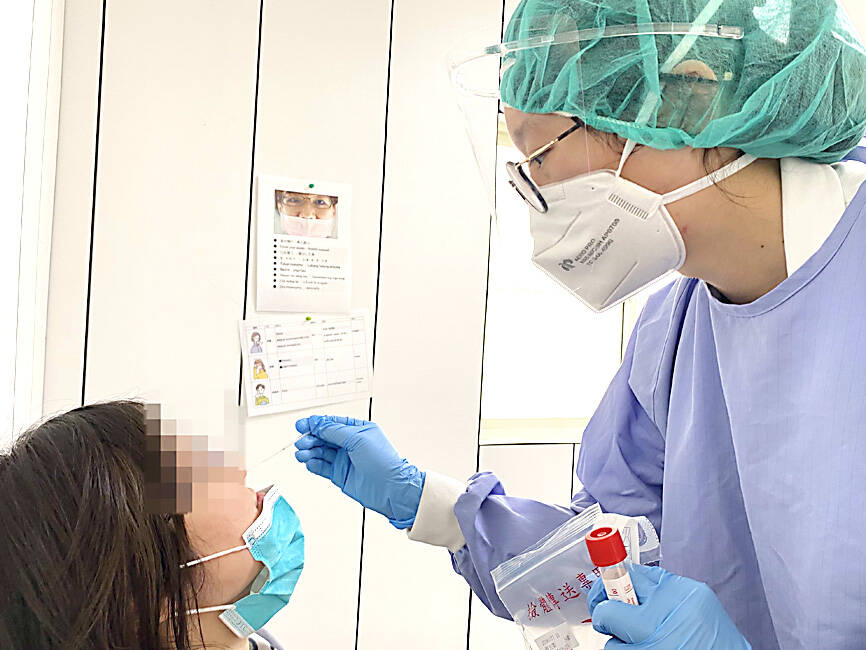The Food and Drug Administration (FDA) yesterday said companies that have import permits for three COVID-19 at-home rapid test kits did not submit an evaluation report on whether their products can test for Omicron subvariant XBB, so their efficacy is unknown, but they can still be sold.
As the current dominant SARS-CoV-2 virus globally and in Taiwan is the Omicron subvariant XBB, the FDA in June asked companies that have a permit for importing or manufacturing COVID-19 rapid test kits to submit an evaluation report on whether their products can test for XBB, within a month after they had been notified.
FDA Deputy Director Cheng Hwei-fang (陳惠芳) yesterday said that of the 43 types of COVID-19 rapid test kits, 25 companies have provided the required data proving that their products can test for XBB.

Photo: Tang Shih-ming, Taipei Times
There were also permits for eight products that were not actually imported and the permits for five products have expired, while two products are out of stock, she said, adding that reports for three types of imported test kits were not submitted.
Chen said the three types of imported test kits are “PCL Self Test-Covid19 ag” imported from South Korea by two different companies, with two different Chinese product names (易可安唾液家用抗原檢測套組 and 五鼎捷測唾液型家用新冠抗原), and “Indicaid covid-19 rapid antigen at-home test” (集克家用新冠病毒抗原快速檢測試劑盒) imported from Hong Kong.
There are still about 358,000 kits of the three types in stock or being sold, but as the nucleocapsid protein of XBB is the same as Omicron subvariant BA.5, and the tests kits had all been tested for efficacy against BA.5 when it was the dominant variant, and there are no global warning signs that existing rapid test kits have worse efficacy for testing XBB, the three products can still be sold in Taiwan, she said.
Chen said the three products met the criteria for Emergency Use Authorization when they applied for import permits, so although they did not provide reports on their efficacy for testing XBB, there is also no evidence that they have worsened efficacy when testing for XBB, so the FDA would not ask them to pull their products unless data prove otherwise.
The names of the products have been publicized so that consumers know and can carefully consider whether to purchase the test kits, she said, adding that people should also check the expiration date before using a test kit.

Left-Handed Girl (左撇子女孩), a film by Taiwanese director Tsou Shih-ching (鄒時擎) and cowritten by Oscar-winning director Sean Baker, won the Gan Foundation Award for Distribution at the Cannes Critics’ Week on Wednesday. The award, which includes a 20,000 euro (US$22,656) prize, is intended to support the French release of a first or second feature film by a new director. According to Critics’ Week, the prize would go to the film’s French distributor, Le Pacte. "A melodrama full of twists and turns, Left-Handed Girl retraces the daily life of a single mother and her two daughters in Taipei, combining the irresistible charm of

A Philippine official has denied allegations of mistreatment of crew members during Philippine authorities’ boarding of a Taiwanese fishing vessel on Monday. Philippine Bureau of Fisheries and Aquatic Resources (BFAR) spokesman Nazario Briguera on Friday said that BFAR law enforcement officers “observed the proper boarding protocols” when they boarded the Taiwanese vessel Sheng Yu Feng (昇漁豐號) and towed it to Basco Port in the Philippines. Briguera’s comments came a day after the Taiwanese captain of the Sheng Yu Feng, Chen Tsung-tun (陳宗頓), held a news conference in Pingtung County and accused the Philippine authorities of mistreatment during the boarding of

The Chinese Communist Party (CCP) is pushing for residents of Kinmen and Lienchiang counties to acquire Chinese ID cards in a bid to “blur national identities,” a source said. The efforts are part of China’s promotion of a “Kinmen-Xiamen twin-city living sphere, including a cross-strait integration pilot zone in China’s Fujian Province,” the source said. “The CCP is already treating residents of these outlying islands as Chinese citizens. It has also intensified its ‘united front’ efforts and infiltration of those islands,” the source said. “There is increasing evidence of espionage in Kinmen, particularly of Taiwanese military personnel being recruited by the

88.2 PERCENT INCREASE: The variants driving the current outbreak are not causing more severe symptoms, but are ‘more contagious’ than previous variants, an expert said Number of COVID-19 cases in the nation is surging, with the Centers for Disease Control (CDC) describing the ongoing wave of infections as “rapid and intense,” and projecting that the outbreak would continue through the end of July. A total of 19,097 outpatient and emergency visits related to COVID-19 were reported from May 11 to Saturday last week, an 88.2 percent increase from the previous week’s 10,149 visits, CDC data showed. The nearly 90 percent surge in case numbers also marks the sixth consecutive weekly increase, although the total remains below the 23,778 recorded during the same period last year,